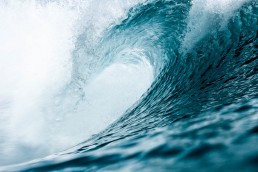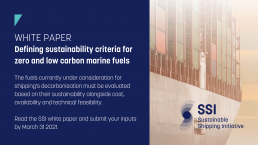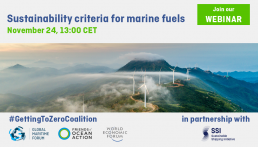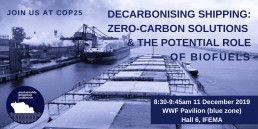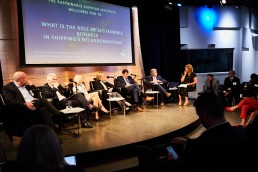Decarbonisation: Sustainability criteria for marine fuels
Time period: 2020-Present
Members involved: Lloyd’s Register, Maersk, WWF
Partner: Copenhagen Business School (CBS) Maritime, Green Shipping Project
Ocean transportation is currently the most environmentally sound mode of transport in terms of CO2 emissions per tonne of cargo transported. Despite this, shipping is still responsible for 2.6% of total global anthropogenic CO2 emissions, which is broadly equivalent to the emissions of Germany.
The adoption in April 2018 of the IMO initial strategy on the reduction of greenhouse gas (GHG) emissions from ships sets out a vision to reduce GHG emissions from international shipping and phase them out entirely in line with the goals of the Paris Agreement. For this to be possible, zero-emission vessels (ZEVs) must enter global fleets as soon as possible.
An initial review showed the sustainability issues surrounding the alternative fuels being explored for shipping’s decarbonisation remain unclear, posing a challenge for the eventual selection of one or more winning fuel options for zero emission shipping.
In 2021, SSI worked to identify a set of sustainability issues, principles and criteria for the alternative fuels under consideration in shipping’s decarbonisation. By engaging with stakeholders including fuel users (such as shipowners) and fuel producers, SSI sought to understand the landscape of sustainability concerns as well as potential areas for action.
- Report: Defining sustainability criteria for marine fuels (September 2021)
- White paper: Preliminary sustainability issues and principles (February 2021)
The sustainability criteria for marine fuels in 2021 was conducted across three phases:
Phase 1: Preliminary compilation of sustainability criteria for marine fuels and presentation of preliminary criteria at key industry forums for initial testing/validation and feeding into ongoing industry initiatives
Phase 2: Research and consultations on sustainability criteria for marine to validate/challenge the preliminary criteria developed in phase 1; explore existing sustainability standards and certification of relevance for marine fuels; and understand stakeholder perceptions and the application of these
Phase 3: Facilitation of the development of a sustainability standard/certification for marine fuels, through engagement with standards and certification bodies to use SSI’s work as a building block to develop a sustainability standard and/or certification for marine fuels
- Define sustainability criteria for the fuels being considered as part of shipping’s decarbonisation, to establish their sustainability credentials and facilitate certification, includnig production processes and other inputs that may be relevant for lifecycle assessment
- Map existing sustainability standards, targets and certifications of relevance for alternative fuels.
- Facilitate an assurance process and common reference point for the industry around sustainability criteria for zero and low carbon fuels.
News & Resources
SSI presents at the Our Ocean Conference
March 13, 2023
Defining sustainability criteria for marine fuels
September 8, 2021
Infographic: The well-to-wake lifecycle of zero and low carbon fuels
September 8, 2021
Webinar: Sustainability criteria for marine fuels
December 3, 2020
New collaboration between academia and industry partners defines sustainability criteria for marine fuels
LONDON/COPENHAGEN, 1 September 2020 – The Sustainable Shipping Initiative (SSI) and Copenhagen Business School (CBS) Maritime today announce a new partnership under the Green Shipping Project.
Bringing clarity to the sustainability issues surrounding the alternative fuels under consideration for shipping’s decarbonisation, the collaboration focuses on defining criteria to establish these fuels’ sustainability credentials and to facilitate their certification. No sustainability standard nor related certification scheme currently exist for marine fuels.
SSI and CBS Maritime’s partnership will see the development of a set of sustainability criteria for marine fuels, applying these criteria to assess the alternative fuels currently being explored for zero-emission shipping. The criteria will also feed into a number of decarbonisation initiatives across the maritime and energy sectors. SSI will subsequently engage with certification bodies to facilitate the development of a sustainability standard or certification scheme for marine fuels.
The collaboration is carried out under the Green Shipping Project, an international research partnership managed jointly by CBS Maritime and the Centre for Transportation Studies at the University of British Columbia’s (UBC) Sauder School of Business in Vancouver. With the aim of advancing knowledge and understanding towards the progressive governance of sustainable maritime transport, the Green Shipping Project was launched in 2017 and is a collaboration of 18 universities and 19 government, industry, and NGO partners. Funded by the Social Sciences and Humanities Research Council of Canada, the international maritime research network is focused on five areas of research: Trade and Logistics; Green Ports; Innovation; Stakeholders; and Value Chains.
Andrew Stephens, Executive Director at SSI said: “SSI is about collaboration among ambitious and action-oriented leaders spanning the shipping value chain, including our peers in academia. Our partnership with CBS Maritime through the Green Shipping Project will contribute thought leadership to the broader debate currently underway in the maritime sector.
“Today, we have no clarity nor consensus on the sustainability issues surrounding the fuels being explored for shipping’s decarbonisation, and the criteria to assess their sustainability remain undefined. This work will contribute to this debate and ultimately, inform the selection of one or more winning options for zero-emission shipping.”
Dr. Henrik Sornn-Friese, Co-Director of the Green Shipping Project and Director and Associate Professor at CBS Maritime said: “CBS Maritime was established in 2013 to bridge the economics and management disciplines at CBS and collaborate with businesses and other knowledge institutions to advance the complex challenges of global shipping and the broader maritime industry. It became a stepping-stone for truly cross-disciplinary research collaboration across three continents in the Green Shipping Project.
We believe that university-industry collaboration is critically important for the achievement of sustainable growth and industry transformation, commercialization and competitiveness, as well for the advancement of academia and higher education. High-quality academic research is pivotal in creating new scientific knowledge that industry does not possess, nor can create on its own. Our partnership with SSI is extraordinary in bringing together a global network of stakeholders in resolving one of the biggest challenges in today’s international maritime shipping”
Dr. David Gillen, Principal Investigator of the Green Shipping Project and Director of the Centre for Transportation Studies and Professor at UBC’s Sauder School of Business said: “Our research collaboration with SSI on alternative fuels provides a rich contribution to the goals of our green shipping project. It is critical and timely for not just helping to understand the challenges but also the opportunities for the essential transformation of the maritime sector.”
More on the Green Shipping Project
Download press release (pdf)
Report launch at COP25: The Role of Sustainable Biofuels in the Decarbonisation of Shipping
On 11 December at COP25 in Madrid SSI hosted a side event at the UN’s annual climate conference – COP25 – during which the report The Role of Sustainable Biofuels in the Decarbonisation of Shipping was launched.
This event was the culmination of SSI’s inquiry into the sustainability and availability of biofuels for shipping. Throughout 2019, SSI’s inquiry has explored the issues at play surrounding the sustainability and availability of biofuels for shipping, bringing an important perspective to the conversation on alternative fuel options for decarbonisation and accelerating the delivery of emission reductions. SSI supports a zero-emission shipping sector by 2050 and is both fuel- and technology-agnostic.
Speakers:
- Andrew Stephens, Executive Director, Sustainable Shipping Initiative
- Simon Bennett, General Manager – Sustainable Development, The China Navigation Company
- Fernanda Carvalho, Policy Manager Global Climate and Energy Pratice, WWF
The Role of Sustainable Biofuels in the Decarbonisation of Shipping
The Role of Sustainable Biofuels in the Decarbonisation of Shipping: The findings of an inquiry into the sustainability and availability of biofuels for shipping outlines the findings of an inquiry commissioned by the SSI, reflecting a stakeholder consultation process facilitated by SSI member Forum for the Future to explore the potential role (if any) of biofuels in the decarbonisation of shipping. Forum for the Future conducted the desktop literature review as well as facilitated stakeholder consultations, and put forward a draft of preliminary key findings on which the conclusions were drawn by the SSI membership.
The process was guided by SSI’s Decarbonisation Working Group, whose members played an integral role throughout the consultations. It also benefited from the active engagement and contributions from speakers and participants of the seminars, webinar and Climate Week NYC event.
The report was launched at the 2019 United Nations Climate Change Conference, COP25 (Madrid, 11 December 2019).

Climate Week NYC: What is the role of sustainable biofuels in shipping's decarbonisation?
On 25 September 2019 the Sustainable Shipping Initiative held an event as part of Climate Week NYC. Our panelists offered their views on the role of shipping in the broader energy transition; the risks and opportunities presented by biofuels to shipping; and the question of competition for biofuels with other sectors, such as aviation, among other questions.
This event was part of SSI’s inquiry into the sustainability and availability of biofuels for shipping, which culminated in the launch of our report, The Role of Sustainable Biofuels in the Decarbonisation of Shipping, at a COP25 event in Madrid.
Moderator: Sally Uren, Chief Executive, Forum for the Future
Panelists:
- John Kornerup Bang, Head of Sustainability Strategy & Chief Climate Change Advisor, A.P. Moller-Maersk
- Lord Adair Turner, Chair, Energy Transitions Commission
- Kirsi Tikka, Independent Non-Executive Director
- Christine Weydig, Director, Office of Environmental and Energy Programs, Port Authority of New York and New Jersey
- Gerard Ostheimer, Managing Director below50, World Business Council for Sustainable Development
- Manuel Pulgar Vidal, Leader of Climate & Energy Practice, WWF (former Environment Minister of Peru & President of COP20)

